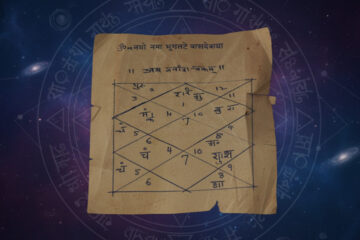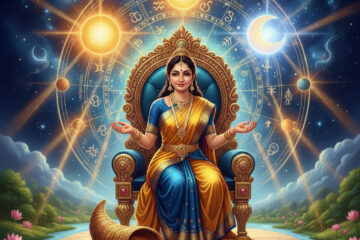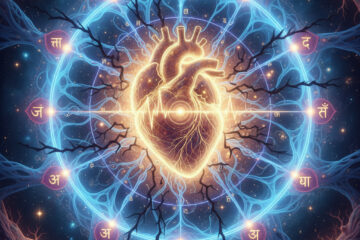Manglik dosha, also called Kuja Dosha or Mangal Dosha, might be the single most misunderstood concept in Jyotish. You’ve probably heard the script: “If you’re Manglik, your marriage will suffer, you’ll fight constantly, someone will leave, disaster will follow.” That’s the folklore. Classical practice is much more nuanced. In real Vedic astrology, Manglik dosha is not a curse on marriage — it’s a Mars pattern that needs intelligent handling, context, and maturity. Nothing in a birth chart is doom in isolation. Repetition across factors is what matters.
So let’s strip the fear out of this. We’ll define Manglik dosha properly, explain why Mars in certain houses creates tension in partnership, show you when it’s actually cancelled, and clarify when it’s just a personality-growth assignment and not a tragic prediction. We’ll also bring in dignity, Navamsa strength, Ashtakavarga, functional benefic vs functional malefic status, and the age-28 Mars maturity point — because Jyotish always asks you to read the whole chart, not just one yoga in a vacuum.
What Is Manglik Dosha (Kuja Dosha) in Practice?
Manglik dosha forms when Mars occupies sensitive relationship-linked houses: traditionally the 1st, 4th, 7th, 8th, or 12th house from either the Ascendant (Lagna) or the Moon. Some lineages use the 2nd house instead of the 1st. Why these houses? Because they’re tied to identity and partnership (1st/7th), emotional security and home atmosphere (4th), intimacy and shared vulnerability (8th), private space and surrender (12th), and direct marriage karma (7th). Mars is force, heat, assertion, competitiveness. Marriage requires cooperation, receptivity, and steady empathy. You can see the tension.
In plain terms: Manglik dosha is saying, “Mars energy is active in the zones where you have to share your life with someone.” If that energy is immature, it can come out as control, impatience, defensiveness, sexual volatility, or a “win/lose” mindset in arguments. If it is mature, the same Mars becomes devotion, loyalty, protection, initiative, and passion. Mars is not anti-love. Mars is drive. The question is: drive in service of what?
The Myth vs the Reality of Manglik Dosha
If Manglik dosha were automatically disastrous, half the population would never have stable relationships. That clearly isn’t true. The idea that Kuja Dosha guarantees divorce or tragedy is cultural fear, not classical inevitability. Jyotish is specific: you only judge Manglik dosha properly after checking Mars’ dignity, functional nature, aspects, Navamsa condition, and timing. A “Manglik” Mars that is exalted, protected by Jupiter, and functionally benefic can actually anchor loyalty and long-term partnership.
Here’s the reframe that serious students must adopt: Manglik dosha is not a verdict. It is a management instruction. It tells you what energy you must learn to handle in relationships: anger, ego, intensity, defensiveness, autonomy needs. That’s it. It’s not a curse, it’s homework. Mars asks, “Can you express desire without domination? Can you assert yourself without contempt? Can you stay in passion without turning it into war?”
Why These Houses Matter: Mars and Relationship Dynamics
To interpret Manglik dosha, you have to know why Mars in each of these houses can create friction — and how that same placement can also create courage and loyalty when dignified.
- 1st House (or sometimes 2nd, depending on school): Mars here makes the personality direct, individualistic, sometimes combative. In marriage this can feel like “my way first.” But the same placement can also produce a partner who defends the relationship fiercely and refuses to tolerate disrespect.
- 4th House: The 4th is emotional security and home atmosphere. Mars here can indicate frustration in the home, volatile moods, or restless domestic energy. But if Mars is strong, this becomes “I will build and protect my household” energy — a doer, not just a complainer.
- 7th House: This is the classic Manglik dosha flag. Mars in the 7th can create power struggles and passionate but reactive bonding. The person either wants control or attracts equally forceful partners. Healthy version: no passivity. Both people show up honestly.
- 8th House: The 8th is shared resources and deep intimacy. Mars here can mean explosive emotional entanglement or mistrust if afflicted. But it also brings radical honesty and capacity for deep transformation together. It can bond people through crisis, not split them.
- 12th House: The 12th is surrender, sleep, and private vulnerability. Mars here can store anger under the surface until it bursts. It can feel like “quiet resentment.” But when handled consciously, the same placement gives strong sexual passion and willingness to fight for private intimacy.
So yes, Mars in these houses can make partnership intense. But intensity itself is not failure. Intensity without maturity is the problem. That’s where the rest of the chart steps in.
Cancelling or Softening Manglik Dosha (Mangal Dosha Cancellation Factors)
This is where most fear-based astrology falls apart. Manglik dosha is not “yes/no.” It’s modified — sometimes nearly erased — by strength, dignity, and benefic influence. These are some of the most reliable mitigating factors:
- Dignity of Mars: Mars in its own sign (Aries, Scorpio) or exalted (Capricorn) behaves like a disciplined warrior, not a reckless fighter. In such dignity, Mars tends to protect the relationship, not destroy it. Even Mars in a friendly fire sign like Leo can act proud and loyal instead of hostile.
- Functional Benefic Mars: Mars is not always a “malefic.” For some ascendants (for example Cancer or Leo lagnas), Mars rules a Kendra + Trikona and becomes a yoga karaka, i.e. a functional benefic. A functional benefic Mars in those lagnas can actually stabilize life through effort and commitment, softening Manglik dosha.
- Association with Jupiter: Jupiter’s aspect or conjunction is one of the classic safeguards. Jupiter brings wisdom, ethics, forgiveness, and patience. When Jupiter aspects Mars, impulsive anger turns into directed courage. Many astrologers consider a strong Jupiter influence to dramatically neutralize Kuja Dosha.
- Navamsa (D9) support: If Mars is placed in a friendly, own, or exalted sign in the Navamsa, the harsh edge of Manglik dosha weakens. The D9 shows maturity in partnership. A weak Mars in D1 but a dignified Mars in D9 often plays out as: early friction, later stability and loyalty.
- Ashtakavarga points: If Mars contributes 5 or more bindus in its sign (especially in the relevant house), it tends to act more constructively. High bindus = the chart can work with that Mars energy rather than be burned by it.
- Distance from Bhaav Madhya: Residential strength matters. If Mars sits far from the most effective point of the 7th house — say, more than ~10° off the house center — its day-to-day impact on marriage may be much less than people fear. We care about actual house strength, not just sign-based headlines.
- Maturity of Mars (Age ~28): Mars “matures” around age 28. Before that, especially in Manglik dosha charts, the same energy can act impulsively. After that age, it tends to cool, focus, and act with purpose. This is one technical reason many traditional astrologers gently suggest later marriage for strong Kuja Dosha charts: you’re letting Mars grow up before asking it to share space with another person.
- Venus and the 7th Lord: The real marriage story is Venus (universal karaka of relationship), the 7th lord, and the condition of the 7th house itself. If Venus is strong, unafflicted, and well-aspected, and if the 7th lord has dignity, Manglik dosha loses most of its fear factor. You always confirm relationship promise with Venus, not just Mars.
Notice what we’re doing: we’re refusing to isolate a single placement. We are reading Mars’ dignity, functional nature, Navamsa strength, benefic contact, and timing. That is real Jyotish. Anything else is superstition dressed as astrology.
Manglik Dosha and Timing: Dashas and Maturity Windows
A huge mistake in pop astrology is pretending Manglik dosha acts 24/7, forever. That’s not how charts work. Dashas propose, transits dispose. Mars-related pressure in relationships peaks during Mars Mahadasha or Mars Antardasha, or when Mars heavily transits the natal 7th/8th/12th. Outside of those windows, the same person may be calm, devoted, and stable. This is why two people with “the same Manglik dosha” can have totally different timelines of stability and friction — their dashas aren’t the same.
Also important: transits of slow planets like Saturn and Jupiter across the 7th house or aspecting Venus can stabilize or test marriage karma regardless of Manglik dosha. In other words, Manglik is not always the trigger. Sometimes Saturn across your 7th is the real pressure test, not Mars natally in the 7th.
The Core Lesson of Manglik Dosha
The soul lesson of Manglik dosha is not “you will suffer in love.” The lesson is “you cannot do relationship on autopilot.” Mars demands self-awareness. It demands emotional regulation. It demands that you learn to assert without humiliating the other person and to defend your needs without defaulting to combat.
When that lesson is integrated, Manglik dosha matures into loyalty, protectiveness, passion, and staying power under stress. Mars is the planet that runs into the burning building. A dignified Mars in the 7th does not abandon the partner; it fights for them — sometimes too hard, sometimes clumsily, but from raw devotion.
In modern terms: Manglik dosha is not “you are cursed.” It is “you must develop emotional maturity sooner than average if you want partnership to work.” That’s not doom. That’s an assignment.
Important Notes
Does Jupiter’s aspect or conjunction cancel Manglik dosha?
In many cases, yes. Jupiter is a natural benefic and, more importantly, can function as a guide. When Jupiter aspects or conjoins Mars, it reframes Mars’ heat as purpose instead of anger. The native becomes more disciplined, more protective, more constructive, less explosive. This is one of the classic Manglik dosha cancellation factors astrologers look for.
Is Manglik dosha still “active” if Mars is exalted or in its own sign?
When Mars is exalted (Capricorn) or in own sign (Aries, Scorpio), most of the fear-based interpretation falls apart. A strong, well-dignified Mars tends to be strategic, not reckless. It shows controlled intensity, problem-solving, taking initiative. In marriage, that can read as “I will handle it” instead of “I will fight you.” Dignity matters more than the label “Manglik.”
Does Manglik dosha become milder if Mars is technically in the 6th by Bhava but looks like 7th by sign?
Yes. Always check Bhava Chalit. If Mars is near a cusp but actually lands in the 6th house by actual house calculation, the harshness on marriage drops. The 6th is an upachaya house — a house that improves through effort and time. Mars in the 6th can show conflict, yes, but it also shows problem-solving, resilience, and the ability to work through issues rather than abandon them.
Is Manglik dosha “worse” before age 28?
Often, yes. Mars matures around age 28. Before that, Mars can express more impulsively: ego defense, quick anger, zero patience. After Mars matures, the same person can express passion with control. This is why delayed marriage can be a perfectly valid practical “remedy” for Manglik dosha. It’s not superstition; it’s developmental astrology.
Does a strong Venus override Manglik dosha?
A strong Venus (good dignity, no harsh afflictions, supportive aspects) is a huge stabilizer. Venus governs harmony, bonding, attraction, and forgiveness. If Venus is strong and the 7th lord is strong, Manglik dosha rarely plays out as breakup energy. Instead it becomes “we argue hard but we also love hard and stay.” Always check Venus and the 7th lord before calling anything dangerous.
FAQ
Can a Manglik marry a non-Manglik safely?
Yes. The idea that “only two Mangliks can marry each other” is a simplification and, frankly, superstition. Synastry in Jyotish is not just Mars-to-Mars comparison. You compare the 7th houses, the 7th lords, Venus (for everyone), the Moon (emotional baseline), and the Navamsa. If those line up well, Manglik/non-Manglik pairings can be completely healthy. Compatibility is holistic, not checkbox-based.
Does Mars in the 8th house always threaten the spouse’s life?
No. The 8th house deals with vulnerability, shared resources, secrets, and transformation. Mars in the 8th can show intensity, control issues, or crisis bonding — but you cannot jump straight to “danger to spouse.” You must read dignity, aspects, dashas, and lifespan indicators separately. Jyotish is not here to terrify people. It’s here to reveal patterns so we can live consciously.
How does Manglik dosha behave when Venus is especially strong?
A strong Venus creates softness, sensuality, forgiveness, and the impulse to repair rather than escalate. This is why Manglik dosha plus benefic Venus often shows couples who argue loudly but also reconcile sincerely. Instead of permanent rupture, you get passionate cycles of rupture–repair. That is not “cursed marriage.” That is “intense but alive marriage.”
Is there a remedy for Manglik dosha?
Classically, people mention Red Coral for Mars, Hanuman worship, fasting on Tuesdays, or reciting Hanuman Chalisa. These are devotion-based ways to align with disciplined Mars instead of reactive Mars. But gemstone use must be careful: only strengthen Mars if it is functionally benefic in your chart. We never blindly boost a planet that is acting as a functional malefic. The most reliable “remedy,” always, is conscious communication, anger regulation, and respect for your partner’s boundaries. Astrology gives awareness; you still have to practice the skill.
Is Manglik dosha harsher for women?
No. That belief is cultural, not astrological. Mars represents assertion, desire, and willpower in everyone. Manglik dosha simply shows how that Mars behaves in intimate space. Gender does not decide how Mars will act. What decides it is functional role (is Mars a yoga karaka or a troublemaker for that Lagna?), dignity, aspects, and maturity.
Stay With Much Needed Astro
Manglik dosha is not a life sentence. It’s a Mars training program. When you learn how to read Mars with dignity, Navamsa strength, Bhava placement, functional benefic/malefic status, and Jupiter/Venus support, the fear dissolves and actual wisdom shows up. That’s how real Jyotish is supposed to work: no doom, just clarity and responsibility.
If you’re serious about studying real Jyotish, stay with Much Needed Astro — no fluff, no fear-mongering, just clarity you can actually use.




